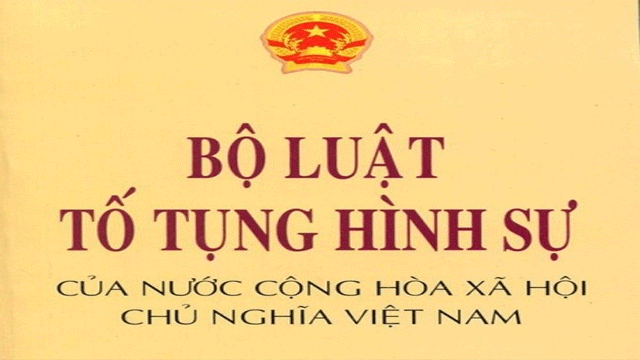This is a new regulation proposed in the Draft Joint Circular currently being consulted by the Ministry of Public Security - the Supreme People's Procuracy - the Supreme People's Court - the Ministry of National Defense, with the main content regarding the procedures, sequence, duration, and location where the accused (or the legal representative of a legal entity) can read and transcribe copies of documents or digitized documents related to the prosecution, defense, or other relevant documents related to the defense.
The Accused is Informed of the Right to Read and Take Notes on Documents
Article 4 of the Draft Joint Circular clearly states: The authorized individuals conducting the proceedings assigned to handle and resolve the case, when delivering the Investigation Conclusion of the criminal case proposing prosecution and the Indictment to the accused, must notify and explain their right to read, take notes on copies of documents or digitized documents related to the charge, exoneration, or other documents related to their defense after the investigation is concluded, upon their request.
The notification must be recorded in the Delivery Receipt of the Investigation Conclusion or the Delivery Receipt of the Indictment and be included in the criminal case file.
Advance Notification of the Time and Place for the Accused to Read and Take Notes on Documents
- For accused who are not subject to temporary detention measures: Reading and taking notes on documents shall be conducted at the headquarters of the authority conducting the proceedings. The authority handling and resolving the case must notify the accused within a reasonable time frame from the date of notification so they can come to read and take notes on the documents.- For accused who are subject to temporary detention measures: The authority conducting the proceedings allows the accused to read and take notes on the documents in the interrogation room of the detention facility. The person in charge of the proceedings must directly notify and allow the accused to read the documents during that notification.
Time Limits for the Accused to Read and Take Notes on Documents
►The time allowed for the accused to read and take notes on documents is no more than 2 hours per session, and no more than 2 sessions per day.
From the conclusion of the investigation to the prosecution stage, the accused may read and take notes on documents no more than:
- 2 sessions for less serious and serious crimes;- 3 sessions for very serious crimes;- 4 sessions for particularly serious crimes.
After the Procuratorate issues the Indictment and transfers the file to the Court for prosecution, the accused may read and take notes on documents no more than:
- 2 sessions for less serious and serious crimes;- 3 sessions for very serious crimes;- 4 sessions for particularly serious crimes.
In necessary cases, the Chief Procurator, and the Chief Judge may decide to allow the accused additional time to read and take notes on documents but no more than 1 additional session.
► In cases where the case is returned by the Prosecutor's Office for supplementary investigation, from the conclusion of the investigation to the prosecution stage, the accused may read and take notes on documents no more than:
- 2 sessions for less serious, serious, and very serious crimes;- 3 sessions for particularly serious crimes.
► In cases where the Court returns the case for supplementary investigation not covered under clause 2, Article 246 of the Criminal Procedure Code, during the stage before the decision to bring the case to trial, the accused may read and take notes on documents no more than:
- 2 sessions for less serious, serious, and very serious crimes;- 3 sessions for particularly serious crimes.
► In the case where the first-instance criminal judgment or appellate criminal judgment is annulled for reinvestigation, the time allowed for the accused to read and take notes on documents is no more than 2 hours per session, and no more than 2 sessions per day.
07 Cases of Denying the Accused the Right to Read and Take Notes on Documents
- Documents related to state secrets; professional secrets, business secrets, personal privacy, family secrets of participants in proceedings who requested the competent authority conducting the proceedings to keep confidential according to the Criminal Procedure Code and relevant laws. This includes information and documents wherein the participants in proceedings who were informants, reporters of crimes, or propose prosecution requested the authority to keep confidential.- Decisions, orders, and legal documents that have been delivered to the accused or legal representative of the legal entity as stipulated by the Criminal Procedure Code;- When there is evidence determining that the accused or the legal representative of the legal entity solicits, coerces, instigates others to falsely declare, provide false documents; destroys, forges evidence, documents, electronic data, objects of the case; threatens, controls, retaliates against witnesses, victims, crime reporters, and their relatives;- When there is evidence determining that the accused or the legal representative of the legal entity discloses case information, investigative secrets; uses the read and noted documents to infringe upon the interests of the State, public interests, or the lawful rights and interests of agencies, organizations, individuals;- When the investigation of the case, investigation recovery, supplementary investigation, reinvestigation is not yet concluded, or the Court has decided to bring the case to trial;- When the competent proceeding authority has decided to suspend the investigation or temporarily suspend the investigation; suspend the investigation or temporarily suspend the investigation against the accused; suspend or temporarily suspend the case; suspend or temporarily suspend the case against the accused;- The accused is physically or mentally impaired and cannot self-defend.
View the full content Draft Joint Circular
 Article table of contents
Article table of contents





.Medium.png)
.Medium.png)
.Medium.png)
.Medium.png)
